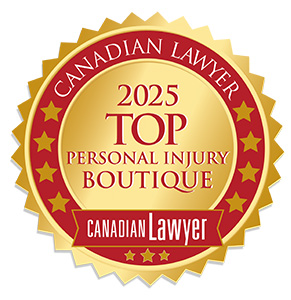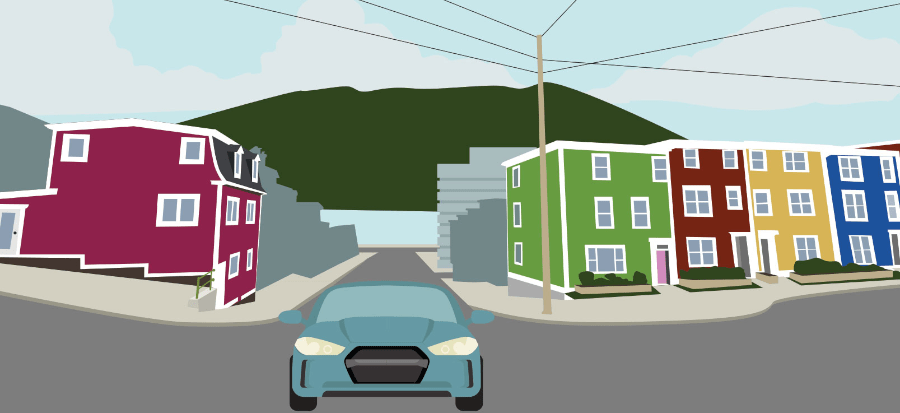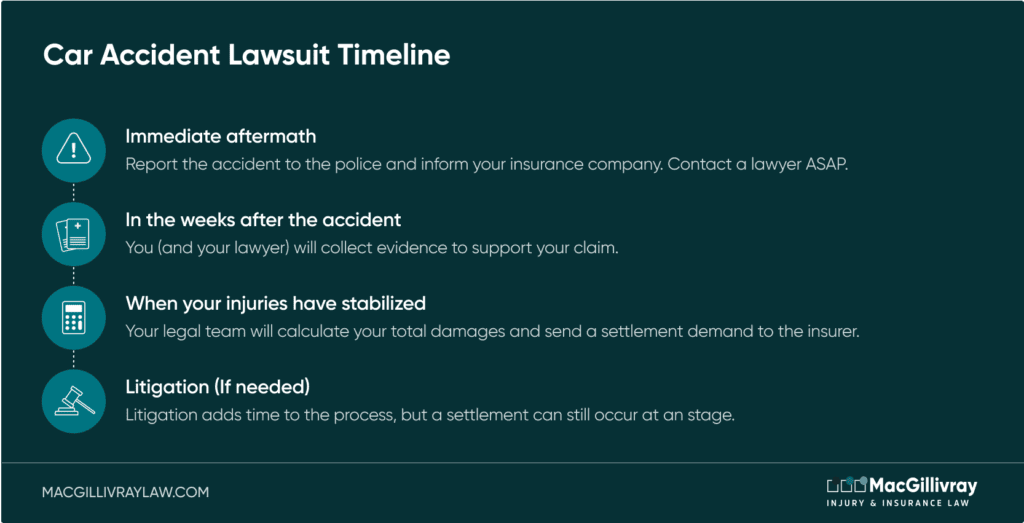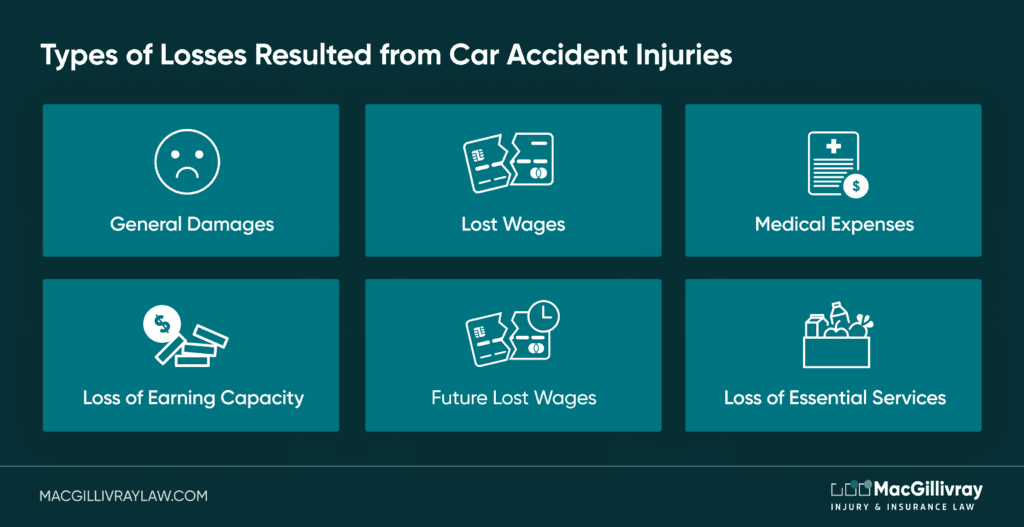




In 2021, there were over 200,000 Canadians involved in motor vehicle accidents, according to Transport Canada’s National Collision Database. According to the same source, almost 50% of those involved in motor vehicle accidents were injured.
After you get in a car accident, you may wonder: is it worth getting a personal injury lawyer? What am I entitled to if I am injured in a car accident? How does car insurance work when I have been involved in an accident?
As you navigate life after your accident, dealing with insurance companies, recovery, and returning to work can feel overwhelming. Seeking legal advice early in the process is one way people sustaining injuries from car accidents can ensure they receive the compensation they are entitled to.
What to Do After a Car Accident in Newfoundland and Labrador?
If you are involved in a motor vehicle accident in Newfoundland and Labrador, your first priority is safety. Once everyone is out of danger, take the following steps to protect your health, your rights, and any potential insurance claim:
- Ensure safety and call for help: Check for injuries and call 911 if anyone is hurt or the scene is unsafe. If possible, move vehicles out of traffic and turn on hazard lights to prevent further accidents.
- Exchange information: Trade contact and insurance details with the other driver(s) involved, including names, phone numbers, license plate numbers, and insurance policy numbers. This information is crucial for filing insurance claims.
- Gather evidence: If you can, take photos of the vehicles, the overall scene, and any visible injuries. Note the time, location, and road conditions. If there are witnesses, get their names and contact info. These details can help establish what happened and who was at fault.
- Report the accident to police: In Newfoundland and Labrador, accidents that cause any injury or over $2,000 in property damage must be reported to law enforcement. Even for minor fender-benders, it’s wise to have a police report for an official, unbiased record of the incident.
- Notify your insurance company: Contact your auto insurer as soon as possible to report the collision. Provide them with the basic facts. Prompt notification is often required by insurance policies and it ensures you can access benefits like vehicle repairs and medical coverage.
- Seek medical attention: See a doctor as soon as you can, even if you feel fine. Some car accident injuries (like whiplash or concussions) may not show symptoms right away. A medical exam protects your health and creates a record of any injuries in case you pursue a claim.
The moments after a crash can be overwhelming, but following these steps will help protect you both medically and legally. If you’re unsure about the next steps or feeling stressed, our car accident lawyers are here to support you. Contact us for a free consultation.
How does car insurance work when you get in a car accident?
There are two insurance companies involved: the first is your insurance company, and it is the Section B automobile insurer. The second is the insurance company for the at-fault driver, called the Section A insurer. A claim against Section A insurance is when the driver who was not at-fault is seeking compensation for lost wages, pain and suffering and the cost of future medical or paramedical treatment.
The Section A insurer and the driver who was not at-fault have an adversarial relationship. They are often cordial and even friendly, but they have no legal obligation to help or compensate you. They insure a third party–not you–and these obligations are to their stakeholders and the third party.
If you’ve been injured in an accident and the at-fault driver’s insurer asks you to provide a written or oral statement, it is often best to speak with an injury lawyer before complying. You are not required to make a statement to the at-fault driver’s insurance company.
Does the type of collision determine who is at fault?
Not necessarily. Fault is determined on a case-by-case basis. While some accident types may strongly indicate that one party was responsible, like being rear-ended by a speeding vehicle, it is not necessarily the case in all circumstances.
While insurance companies and police provide evidence in determining who is at-fault in a car accident, it is ultimately decided by the Courts.
The party who is at fault will be liable for the damages caused by an accident, including injuries.
How long do I have to file a claim after a car accident in Newfoundland and Labrador?
In general, the legal limitation period for filing a motor vehicle accident claim is two years from the date of the accident in Newfoundland and Labrador, although there are exceptions. There are other time limits that apply to no-fault claims under Section B in Atlantic Canada. At MacGillivray Law, we typically file a lawsuit against the at-fault driver one year after the date of the accident, or once your injuries have healed or the extent of your injuries can be accurately assessed.

It is important to contact a lawyer as soon as possible after a car accident occurs. It is your lawyer’s job to build a strong case for you, which may include preserving evidence from the scene of the accident, gathering witness statements, and consulting with accident reconstruction specialists. The sooner you engage a lawyer, the sooner they can begin their work gathering time-sensitive evidence. Contacting a lawyer promptly also helps ensure that all timelines are met in the litigation process so that your claim can be pursued successfully.
What injuries can you sustain from a car accident?
There are many possible injuries a person can sustain from a car accident. We often represent people with injuries such as those listed below. You can learn more about the general damages for these specific injuries by clicking on the link.
- Whiplash
- Neck injuries
- Spine (below neck) injuries
- Brain and skull injuries
- Back injuries
- Paraplegia
- Burns
- Loss of limbs
How much is my car accident injury worth?
A claim’s value is based on many factors. These factors fall into legal categories called “heads of damages” that set out the types of damages that may be recoverable in a lawsuit.

The severity of your injuries is a major factor in valuing your claim. Our clients’ injuries range in severity, from whiplash and soft-tissue injuries, to broken and fractured bones, to more severe injuries such as traumatic brain injuries, paraplegia and quadriplegia. We also help people who suffer from chronic pain and psychological injuries such as PTSD.
You can use our Injury Claim Calculator to learn more about how to evaluate your claim.
You may also have access to Section B insurance benefits following an accident. These benefits are paid by your own insurer in the event of a motor vehicle accident, and cover reasonable and necessary treatment costs, as well as some other associated costs, regardless of who is at fault for the accident.
When you’ve been injured in a car accident, Section B insurance provides up to $50,000 in coverage for medical and rehabilitation expenses, such as physiotherapy, massage, chiropractic, and nursing care. If you’re unable to work due to your accident injuries, Section B provides coverage towards your lost wages up to a maximum of $250 per week. If you’re unable to perform household duties due to your accident injuries, Section B insurance provides $100 per week in housekeeping benefits for up to 52 weeks. In the event of a death of a loved one, Section B provides up to $2,500 in funeral expenses and death benefits up to $25,000.
Like each person, each case is unique. The best way to learn the value of your claim is to contact an experienced personal injury lawyer who can ensure you receive fair compensation.
What If My Injuries Show Up Days or Weeks Later?
It’s not unusual for some car accident injuries to be felt only days or even weeks after the collision. In the immediate aftermath of an accident, adrenaline and shock can mask pain. Soft tissue injuries like whiplash, muscle strains, and even concussions might not fully develop symptoms until well after the crash. You might feel fine at first, only to wake up with pain in your neck or back a couple of days later.
If you notice injuries or pain days or weeks after your accident, take action right away. First, see a medical professional as soon as possible. Explain that you were in a car accident and describe all new symptoms, no matter how minor they seem. Getting prompt medical attention is important for your health and it creates a medical record linking your injuries to the accident. Follow your doctor’s advice for treatment and keep records of all diagnoses, treatments, and medical bills.
Next, inform your insurance company (and the at-fault driver’s insurer, if you’re already in the claims process) about the newly discovered injuries. Provide the updated medical information. If you’ve already started a claim, your compensation demand can be adjusted to include these additional injuries and their associated costs (like new medical appointments or more time off work). If you haven’t filed a claim yet, note that in Newfoundland and Labrador you generally have up to two years from the date of the accident to start an injury claim. Don’t delay once you realize you’re hurt, but know that a late-arising injury can still be compensated if it’s within the limitation period.
It’s also wise to be cautious about settling an insurance claim too quickly. Insurers sometimes offer a speedy settlement soon after an accident, but if you accept money and sign a release early on, you may give up your right to claim further compensation if other injuries surface later. This is one reason it can help to consult a personal injury lawyer before settling. Our car accident lawyers have worked on many cases where symptoms were delayed, and we know how to handle them so you’re treated fairly. Whenever your injuries appear, we can assist in pursuing the compensation you deserve. Contact us for a free consultation.
Do I have to make a statement to the insurer for the driver who was at fault?
If you’ve been injured in an accident and the at-fault driver’s insurer asks you to provide a written or oral statement, it is often best to speak with an injury lawyer first before complying. You are not required to make a statement to the at-fault driver’s insurance company.
In many ways, the at fault driver’s insurance company is your adversary. They have no legal obligation to help you or even to provide you with compensation. They insure a third party – not you – and these obligations are to their stakeholders and the third party, not you.
Any statement you give to an insurance company after an accident can be used to undermine your claim, so it is important to be careful with what information you provide. While it is important to be transparent and truthful, insurance adjusters can misconstrue parts of your statement and interpret them in ways you did not intend, to portray you as untruthful and undervalue your claim. If you say something wrong, or inadvertently say it the wrong way, it could be used to hurt your claim down the road. A car accident lawyer will communicate with your insurer on your behalf and advise you throughout the legal process.
Do I have to make a statement to my own insurance company?
Yes, you are obliged to cooperate with your insurance company if you want to remain entitled to benefits. In Newfoundland and Labrador, your own insurer, or the insurer for the car you were in, is called the Section B accident benefits insurer. You are in a contractual relationship with your Section B insurer. This means that you each have obligations and duties to one another under the contract. One of your duties is to provide them with the information they need to adjust your claim.
Tips for speaking to either insurance company
If you do choose to give a statement to either insurance company, here are some tips:
- Answer the questions asked and don’t volunteer additional information.
- If you don’t know an answer, clearly state, “I don’t know.”
- Stick to the basics of the accident.
- Don’t admit to fault for the accident.
- Do not exaggerate or downplay the problems caused by your injuries.
- Don’t agree to a settlement without discussing your options with a lawyer, or at least give yourself time to research.
- Keep it simple.
Why should I see a lawyer after a car accident?
Adjustors require specific documentation to justify giving you the compensation you deserve. When you hire a lawyer, we know what adjustors are looking for and cover the costs up-front to get the expert opinions you need. Your lawyer, in more serious cases, can request special reports from independent doctors to get opinions and treatment plans related to your accident injuries. These are called independent medical examinations. Additionally, your lawyer can retain engineers, other experts called actuaries, economists, therapists, psychologists, and other experts to help prove fault or the effect of the accident on you.
Insurance companies have teams of insurance adjusters and lawyers. It is difficult to leverage them to ensure they’re providing fair compensation. If you are negotiating with them, you may feel that you have leverage by threatening to hire a lawyer. Even if you could value your case accurately, the threat of hiring a lawyer is not enough. To have leverage, the case must be properly documented with the right evidence, so the insurance adjustor can justify the settlement to the insurance executives who oversee them. The threat of hiring a lawyer is a soft threat that does not worry the insurance company. Having a lawyer who can build the evidence and leverage the process to help obtain a fair settlement can make a significant difference.
Finally, by hiring a lawyer, you are better able to take on the insurance company and bring them to court if necessary. If providing adequate evidence and leveraging the insurance company is not enough, having representation to guide you through the complicated legal process of a lawsuit is essential for your success and peace of mind. By hiring a lawyer at MacGillivray Law, you can focus on recovering while we take care of your case.
For 30 years, our team of personal injury lawyers have been helping Newfoundlanders involved in motor vehicle accidents receive fair compensation for their injuries.
Frequently Asked Questions
- How can I help my personal injury lawsuit to get the best settlement?
- What should I do right after a car accident?
- How can a lawyer help with my personal injury claim?
- Is the parking lot 50/50 myth true?
- Can apologizing after an accident impact your claim?
- Driving someone else’s car: Am I covered by insurance?
- Can I still sue if I wasn’t wearing a seatbelt?
- Can I sue my rideshare (Uber, Lyft) driver?
- Whiplash after a car accident: Everything you need to know
- Are left turning vehicles always at fault?
- Injured by a drunk driver—how does it impact my claim?
Request a
Free Consultation
If you would like to learn your legal options at no obligation, contact us today to set up a free consultation.


